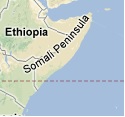Introduction
Following his extensive expedition into the hinterlands of the Somali ecology, Sir Richard Burton, the 19th century acentric British explorer, in his eventual meetings with several Somalis chiefs, in particular Garad Adan Garad Koshin ( Geri) and Sultan Sharmarke ( Issak), gained an intrinsic understanding of Somali kinship, culture, religion, and their system of governance. In his subsequent book, “ First Footsteps in East Africa,” Sir Burton came to the conclusion that Somalis are fiercely republicans and a race that values personal freedom. Other observers of the Somali society, the indomitable student of the Somali society, I. M. Lewis, in particular, commented on the prominence of kinship. What is less emphasized is the dual nature of the Somali society that is on the one had a kinship based society but at the same time a nation conscious of its oneness.2
 This essay would assess the dual nature of the Somali society that is both clan and national in its consciousness. How to structure a sustainable system of governance in a society with these two contradictory attributes is of immense interest to students of Somalia. The unitary- based system of governance that reigned between 1960 and 2012, where Mogadishu suffocated and chocked off the regions no longer holds any appeal to the majority of the Somali society. The observation that Sir Burton made in 1858 that Somalis are republicans is now memorialized in the Transitional Federal Government’s constitution that adopts a federated republic.
This essay would assess the dual nature of the Somali society that is both clan and national in its consciousness. How to structure a sustainable system of governance in a society with these two contradictory attributes is of immense interest to students of Somalia. The unitary- based system of governance that reigned between 1960 and 2012, where Mogadishu suffocated and chocked off the regions no longer holds any appeal to the majority of the Somali society. The observation that Sir Burton made in 1858 that Somalis are republicans is now memorialized in the Transitional Federal Government’s constitution that adopts a federated republic.
The Unity of Clan and Nation
Somali people are keenly aware of their individuality and the private ownership of the herds they each keep. Yet, they observe the rule that land and resources are divided along clan lines, and these resources are accordingly collective endowments. In that regard, one may choose to view Hargaysa, Kismayo, Bossaso, or Mogadishu as cities owned by one or more closely affiliated clans. At the same time, however, these cities and many other locales are Somali geographies. Hence the Somali saying of “geel jire geela waa wada jirtaa wana kala jirta,” or “a herdsman holds his livestock in private while sharing the common good with the larger community,” holds true for the essence of the Somali culture and persona, a persona that permeates in his/her political culture.
Hussein Adam known by the nickname of Hussein Tanzania, writes that “the inherent lineage-based clan nature of “centripetal and centrifugal [tendencies], at once drawing the Somalis into a powerful social fabric of kinship affinity and cultural solidarity while setting them against one another speaks to the essence of the Somali culture of politics”3 This cultural thinking permeates politics and business transactions in both rural and urban ecologies of Somali settlements. This is a clear expression of the way that Somali pastoral individualism and [clan] communal belonging patterns are wrapped in one.
Given this unity of contradictions of the Somali cultural construct, the Somali duality if you will, the habitat is mainly that of clan real estate. Bassaso is a Majeerteen country as much as Hargaysa is an Issaq territory, or Baydhabo as Digil & Mirifle stronghold. By the same token, these territories are at the same time Somali territories. A case in point is the following example: a deadly conflict in Daroor, in the Somali regional State of Ethiopia (Kilil 5), pitted two Issaq sub-clans against each other, quickly spreading to several districts, and resulting in the death of about hundred people in a matter of days in 2007.4
To the chagrin of many, it was not the Ethiopian government that stopped the bloodshed, but the Somaliland administration, which sent a delegation of prominent politicians and traditional elders from Hargaysa to Daroor. This is a case where kinship territorial unity figures prominently in the political culture of the Somali society, regardless of modern state boundary lines. In the last part of the paper we will assess how the concept of clan ownership of different geographies in the Somali Republic is contributing to the formation of regional governments that are posing political challenges to the unitary-based system of governance.
The Read more – The Culture of Politics
Faisal A. Roble
Email: faisalroble19@gmail.com
____________________________________________________________________________________________________
We welcome the submission of all articles for possible publication on WardheerNews.com. WardheerNews will only consider articles sent exclusively. Please email your article today . Opinions expressed in this article are those of the author and do not necessarily reflect the views of WardheerNews.
WardheerNew’s tolerance platform is engaging with diversity of opinion, political ideology and self-expression. Tolerance is a necessary ingredient for creativity and civility.Tolerance fuels tenacity and audacity.
WardheerNews waxay tixgelin gaara siinaysaa maqaaladaha sida gaarka ah loogu soo diro ee aan lagu daabicin goobo kale. Maqaalkani wuxuu ka turjumayaa aragtida Qoraaga loomana fasiran karo tan WardheerNews.
Copyright © 2013 WardheerNews,
All rights reserved


Leave a Reply